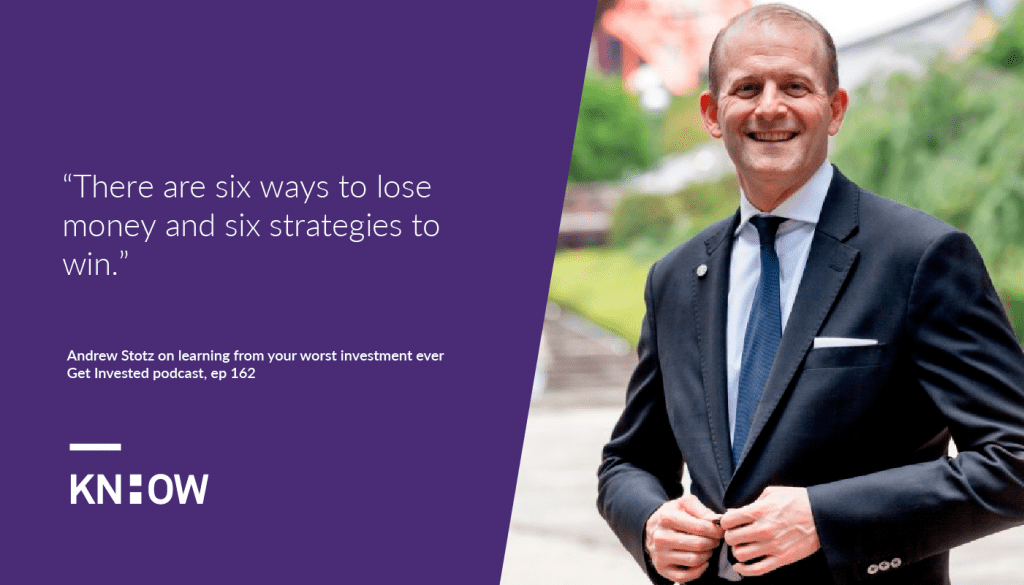Award winning equity analyst Andrew Stotz says there are six strategies that can be adopted to overcome the biggest investment mistakes made by investors.
The author, business leader and investment expert, who hosts the popular My Worst Investment Ever podcast, believes best investors will turn their worst investments into major learning curves which lead to greater opportunities.
He told KnowHow founder Bushy Martin on the Get Invested podcast that there are six most common errors made my investors.
Investment mistake #1: Investors fail to do their own research
“It’s amazing how people just put their money into things without doing any real research. It happens all the time. They hear it from a friend, this or that. Next thing you know, they’re handing over serious amounts of money for something they didn’t really do any research on,” Andrew said.
“So to solve this problem, I challenge you for the next time that you’re looking at an investment to get out a blank piece of paper and do a little research and write down some notes. What do you think this is going to return? Why do you like this idea? Write down your ideas about it.
“Now, what I would highlight in this case is write down your positive ideas. What’s the potential here? We’re talking about huge potential, small potential, right down your positive ideas.”
Investment mistake #2: Failing to properly assess and manage the risks
“‘Assess risk’ means before you get into it, and ‘manage risk’ means once you’re in it. And so what I recommend is that you separate the research that you’ve done on return from the research you’re doing on risk. So, you want to rank the risks by probability and severity and then try to create a risk reduction plan,” Andrew revealed.
“When you separate your research on risk from return, they don’t cloud each other and then turn into a battle, but rather a constructive conversation [on whether or not you should invest].”
Investment mistake #3: Emotional or flawed thinking
Emotional or flawed thinking has particularly been a big one during COVID-19, causing many investors to fall into strife.
“To handle this, find, explore and list opposing views, and then discuss this with a knowledgeable and objective person. I don’t see any other way to do it. You’ve got to kind of map it out and then you’ve got to talk to somebody. Now, maybe you don’t write it all out, you just get someone that you respect who is objective and then talk to them. And that’s how you can try to overcome that,” Andrew said.
Investment mistake #4: Misplaced trust
Misplaced trust can lead to investors losing money through putting their trust in a stranger too soon.
“Nowadays we have all these books that talk about hacking – hacking your fitness and nutrition and all that. But what I can tell you is that from my experience, trust is one thing that cannot be hacked. It can only develop over time. And it’s amazing the number of people that I’ve interviewed who just give their money to someone they never even met. And many people are very, very skilled in getting that money out of the pockets of those people,” Andrew warned.
“It made me really realise that damaging trust just once can last a lifetime. So think about trust. It develops over time and it’s also very rare. I always ask people if you had to tell a real serious secret that the world would like to know but you need to tell one person and you do not want them to tell anybody else, how many people would you trust with that secret?”
Bushy added: “We are actually in the trust business because we have people in the property sphere in Australia, because property as an asset in Australia is much more advantaged than is in most other parts of the world. So, it is certainly an important part of anyone’s investment portfolio in this country. But to get someone to feel comfortable, to invest large amounts of money with you all revolves around trust. And I agree with you. Trust isn’t something that is immediately given, it has to be earned and it has to be earned repeatedly over time.”
Investment mistake #5: Failing to monitor performance
After making an investment, Andrew said many people will fail to monitor their portfolio.
“Imagine a friend came to you and said, ‘I’ve got this idea of this amazing Thai restaurant that I want to start’. And then basically they ask for you to invest and you decide, yeah, I want to put $10,000 in this and see how it goes,” he said.
“What I would suggest to you is that you talk to your friend and say, ‘look, what’s the quietest day of the week?’ Well, maybe Monday. So let’s say he takes the second Monday of every month off, and you say I want to have a one hour call with you to talk about the business and set what I call a regular pre-determined monitoring process. And then, nobody’s going to refuse that when they’re asking for money and then you hold them to it and then get updates on what you’ve got. So I think that’s my way of handling the idea of monitoring the investment.”
Investment mistake #6: A catch-all account invested in a startup
“I just basically say the reality you’ve got to start from is that you’re likely to lose everything. And it’s a binary investment. It’s either a big win or big loss,” Andrew said.
Listen to the full interview here.
Want to Know How you can build wealth with the help of leading, qualified experts? Talk to the team at KnowHow, now.




